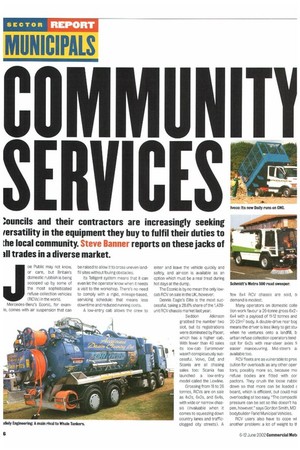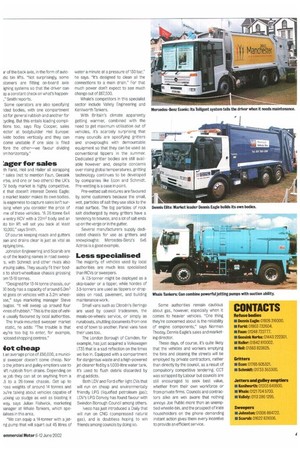UN
Page 46

Page 47

If you've noticed an error in this article please click here to report it so we can fix it.
:ouncils and their contractors are increasingly seeking fersatility in the equipment they buy to fulfil their duties to the local community. Steve Banner reports on these jacks of ill trades in a diverse market.
Joe Public may not know, or care, but Britain's domestic rubbish is being scooped up by some of the most sophisticated refuse collection vehicles (RCVs) in the world. Mercedes-Benz's Ecoric, for examle, comes with air suspension that can
be raised to allow it to cross uneven landfill sites without fouling obstacles.
Its Telligent system means that it can even let the operator know when it needs a visit to the workshop. There's no need to comply with a rigid, mileage-based, servicing schedule: that means less downtime and reduced running costs.
A low-entry cab allows the crew to enter and leave the vehicle quickly and safely, and air-con is available as an option which must be a real treat during hot days at the dump.
The Econic is by no mean the only lowcab RCV on sale in the UK, however.
Dennis Eagle's Elite is the most successful, taking a 28.6% share of the 1,439unit RCV chassis market last year.
Seddon Atkinson grabbed the number two slot, but its regjstrations were dominated by Pacer, which has a higher cab. With fewer than 40 sales its low-cab Euromover wasn't conspicuously successful. Volvo, Daf, and Scania are all chasing sales too: Scania has launched a low-entry model called the Lowline.
Grossing from 18 to 26 tomes, RCVs are on sale as 4x2s, 6x2s, and 6x4s, with wide or narrow chassis (invaluable when it comes to squeezing down country lanes and trafficclogged city streets). A few 8x4 RCV chassis are sold, b demand is modest.
Many operators on domestic colle tion work favour a 26-tonne gross 6x2i 6x4 with a payload of 11-12 tonnes and 20-23m3 body. A double-drive rear boE means the driver is less likely to get still when he ventures onto a landfill, b urban refuse collection operators tend opt for 6x25 with rear-steer axles fl easier manoeuvring. Mid-steers a available too.
REV fleets are as vulnerable to pros cution for overloads as any other oper tors; possibly more so, because mo refuse bodies are fitted with cor pastors. They crush the loose rubbii down so that more can be loaded board, which is efficient, but could mal overloading all too easy. "The compactic pressure can be set so this doesn't ha pen, however," says Gordon Smith, MD bodybuilder Farid Municipal Vehicles.
RCV users also have to cope wi another problem: a lot of weight to tt
1r of the back axle, in the form of autotic bin lifts. "Not surprisingly, some itomers are fitting on-board axle ighing systems so that the driver can 3p a constant check on what's happenSmith reports.
Some operators are also specifying ided bodies, with one compartment ad for general rubbish and another for riycling. But this entails loading oomphLions too, says Roy Cooper, sales actor at bodybuilder Heil Europe: ivide bodies vertically and they can come unstable if one side is filled fore the other—we favour dividing horizontally.'
:ager for sales
th Farid, Heil and Haller all scrapping sales (not to mention Faun, Geesink rba, arid one or two others) the UK's
body market is highly competitive. it that doesn't interest Dennis Eagle; 3 market leader makes tts own bodies. is eagerness to capture sales isn't surising when you consider the once of Ime of these vehicles. "A 26-tonne 6x4 N-entry RCV with a 22m3 body and an to bin lift will set you back at least 10,000," says Smith.
Of course keeping roads and gutters 3an and drains clear is just as vital as nptying bins.
Johnston Engineering and Scarab are fo of the leading names in road sweep's, with Schmidt and other rivals also irsuing sales. They usually ft their Podto short-wheelbase chassis grossing cm 13-18 tonnes.
"Designed for 13-14 tome chassis, our 10 body has a capacity of around 6.0m3 id goes on vehicles with a 3.2m wheelIse," says marketing manager Steve angles. "It will sweep up around four innes of rubbish." This is the size of vehie usually favoured by local authorities. The truck-mounted sweeper market static, he adds: 'The trouble is that ley're too big to enter, for example, iclosed shopping centres."
dot cheap
t an average price of £50,000, a municial sweeper doesn't come cheap. Nor o the jetters and gulley emptiers use to lift rubbish from drains. Depending on )e job they can sit on anything from a .5 to a 26-tonne chassis. Get up to ross weights of around 14 tonnes and cure talking about vehicles capable of Licking up sludge as well as blasting it way, says Julian Fishwick, marketing 'onager at Whale Tankers, which speialises in this area.
"We can equip a 14-tonner with a jetng pump that will squirt out 45 litres of water a minute at a pressure of 130 bar," he says. "It's designed to clean all the connections to a main drain." For that much power don't expect to see much change out 01£67,500.
Whale's competitors in this specialist sector include Vallely Engineering and Kenilworth Tankers.
With Britain's climate apparently getting warmer, combined with the need to get maximum utilisation out of vehicles, it's scarcely surprising that many councils are specifying gritters and snowploughs with demountable equipment so that they can be used as conventional tippers in the summer. Dedicated gritter bodies are still available however and, despite concerns over rising global temperatures, gritting technology continues to be developed by companies like Egon and Schmidt. Pre-wetting is a case in point.
Pm-wetted salt mixtures are favoured by some customers because the small, wet, particles of salt they use stick to the road surface. The big particles of rock salt discharged by many gritters have a tendency to bounce, and a lot of salt ends up on the verge or in the gutter.
Several manufacturers supply dedicated chassis for use as gritters and snowploughs: Mercedes-Benz's 6x6 Actros is a good example.
Less specialised
The majority of vehicles used by local authorities are much less specialised than RCVs or sweepers.
A 7.5-tonner might be deployed as a skip-loader or a tipper, while hordes of 3,5-tonners are used as tippers or dropsides on road, pavement, and building maintenance work.
Small vans such as Citroen's Berlingo are used by council tradesmen, the meals-on-wheels service, or simply as runabouts, shuttling documents from one end of town to another. Panel vans have their uses too.
The London Borough of Camden, for example, has just acquired a Volkswagen LT35 that is a sad ref ection on the times we live in. Equipped with a compartment for dangerous waste and a high-powered jet cleaner fed by a 1,000-litre water tank, it's used to flush debris discarded by drug addicts.
Both LDV and Ford offer light CVs that will run on cheap and environmentally friendly LPG (liquefied petroleum gas); LDV's LPG Convoy has found favour with Swindon Borough Council among others.
lveco has just introduced a Daily that will run on CNG (compressed natural gas), and is doubtless hoping to win friends among councils by doing so. Some authorities remain cautious about gas, however, especially when it comes to heavier vehicles. "One thing they're concerned about is the reliability of engine components," says Norman Thoday, Dennis Eagle's sales and marketing director.
These days, of course, it's quite likely that the vehicles and workers emptying the bins and cleaning the streets will be employed by private contractors, rather than directly by the council, as a resuit of compulsory competitive tendering. CCT was scrapped by Labour but councils are still encouraged to seek best value, whether from their own workforce or from private firms. Councils and contractors alike are well aware that nothing annoys Joe Public more than an unemptied wheelie-bin, and the prospect of irate householders on the phone demanding instant action gives them every incentive to provide an efficient service.




















































































































































